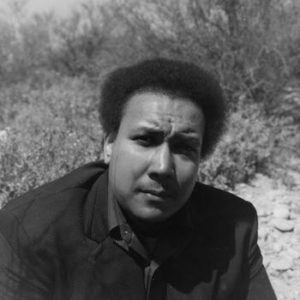
Michael S. Harper
*The birth of Michael S. Harper in 1938 is celebrated on this date. He was a Black poet and educator.
From Brooklyn, New York, he was the son of Walter Warren Harper, a postal worker, and Katherine Johnson Harper, a medical stenographer. In 1951, Harper’s family moved to a predominantly white Los Angeles neighborhood. This racially tense environment was traumatic enough to "make" him a poet. Also, his family’s extensive record collection affected Harper's poetry. Encouraged to pursue medicine, Harper became only a marginal student and graduated from Dorsey High School.
During his high school years, Harper wrote a few poems, but he had not yet considered writing as an option for a career; he had visions o becoming a doctor. In 1955, he enrolled at Los Angeles City College and then Los Angeles State College, which he attended until 1961, during which time he was also employed as a postal worker. He says that his life began here. Many of his coworkers were educated Black men like Harper's father, who had bumped against the racial glass ceiling of advancement in the American workplace. Their experiences, which they shared freely, and his experience of segregated housing at the Iowa Writer's Workshop formed the foundation of Harper’s assessment of America as a schizophrenic society. Nonetheless, Harper credits his years at Los Angeles State, where he read John Keats's letters and Ralph Ellison's Invisible Man, for preparing him for the Iowa Writer’s Workshop, which he began in 1961.
After a year there, Harper taught at various schools, including Pasadena City College (1962), Contra Costa College (1964-1968), and California State College (now University, 1968-1969). He earned a B.A. and M.A. from California State University and an M.F.A. from the University of Iowa. He published more than ten books of poetry, including Songlines in Michaeltree: New and Collected Poems (University of Illinois Press, 2000); Honorable Amendments (1995); Healing Song for the Inner Ear (1985); Images of Kin (1977), which won the Melville-Cane Award from the Poetry Society of America and was nominated for the National Book Award; Nightmare Begins Responsibility (1975); History is Your Heartbeat (1971), which won the Black Academy of Arts & Letters Award for poetry; and Dear John, Dear Coltrane (1970), which was nominated for the National Book Award.
In 1980, Harper edited the Collected Poems of Sterling A. Brown; and Every Shut Eye Ain't Asleep: An Anthology of Poetry by African Americans Since 1945 (1994), and with Robert B. Stepto of Chant of Saints: A Gathering of Afro-American Literature, Art, and Scholarship (1979). He was the first Poet Laureate of the State of Rhode Island (1988-1993). He has received many other honors, including a fellowship from the Guggenheim Foundation and a National Endowment for the Arts Creative Writing Award.
His Images of Kin won the Poetry Society of America's Melville Cane Award. For History Is Your Own Heartbeat, Harper won the Black Academy of Arts and Letters Award for Poetry. In 1990 he received the Robert Hayden Poetry Award from the United Negro College Fund. In 2000, he co-edited Anthony Walton of The Vintage Book of African American Poetry. Michael S. Harper is a University Professor and Professor of English at Brown University, where he has taught since 1970 and lived in Barrington, Rhode Island.
Harper was married and had a daughter, Rachel, a writer, and two sons, Roland and Patrice. He later divorced. He lived in Providence, Rhode Island, until his death on May 7, 2016. Harper had two children who died at birth, which inspired several of his early poems, including the famous "Nightmare, Begins Responsibility."
The Oxford Companion to African American Literature.
Ed. William L. Andrews, Frances Foster Smith, and Trudier Harris.
Oxford University Press.
Copyright © 1997.